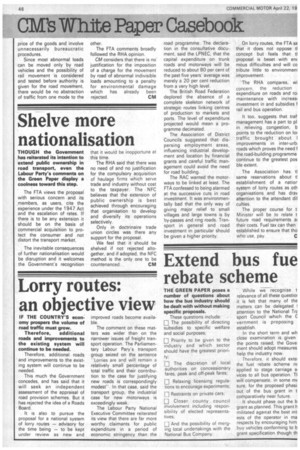Lorry routes: an objective view
Page 48

If you've noticed an error in this article please click here to report it so we can fix it.
IF THE COUNTRY'S econ omy prospers the volume of road traffic must grow. • Therefore, additional roads and improvements to the existing system will continue to be needed.
Therefore, additional roads ' and improvements to the existing system will continue to be needed.
This much the Government concedes, and has said that it will seek an independent assessment of the appraisal of road provision schemes. But it has rejected the idea of a Roads Board.
It is also to pursue the proposal for a national system of lorry routes — advisory for the time being — to be kept under review as new and improved roads become available.
The comment on these matters was wider than on the narrower issues of freight transport operation. The Parliamentary Labour Pary's transport group seized on the sentence "Lorries are and will remain a relatively small percentage of total traffic and their contribution to the case for justifying new roads is correspondingly modest". In that case, said the transport group, the industrial case for new motorways is exceedingly weak.
The Labour Party National Executive Committee reiterated its view that there are far more worthy claimants for public expenditure in a period of economic stringency than the road programme. The declaration in the consultative document, said the LPNEC, that the capital expenditure on trunk roads and motorways will be reduced to about 80 per cent of the past five years' average was merely a 20 per cent reduction from a very high level.
The British Road Federation deplored the absence of a complete skeleton network of strategic routes linking centres of production to markets and ports. The level of expenditure projected would mean a programme decimated.
The Association of District Councils suggested that dispersing employment areas, influencing industrial development and location by financial grants and careful traffic management could avoid the need for road building.
The RAC wanted the motorways to be linked at least. The FTA confessed to being alarmed at the successive cuts in road investment. It was environmentally bad that the only way of giving major relief to small villages and large towns is by by-passes and ring roads. Transport in general and road investment -in particular should be given a higher priority. On lorry routes, the FTA sa that it does not oppose tl concept but feels that ti proposal is beset with enc mous difficulties and will co tribute little to environmeni improvement.
The R HA compares, wi concern, the reduction expenditure on roads and ro maintenance with increasi investment in and subsidies f rail and bus operation.
It too, suggests that trat management has a part to pl in relieving congestion, b points to the reduction on loc traffic brought about I improvements in inter-urb; roads which proves the need f the road-building programme continue to the greatest pos ble extent.
The Association has tl same reservations about ti establishment of a natior system of lorry routes as oth organisations and has dray attention to the attendant dif culties.
The proper course for ti Minister will be to relate t future road requirements ai their costs. Fuel tax can then established to ensure that tho who use, pay.




















































































